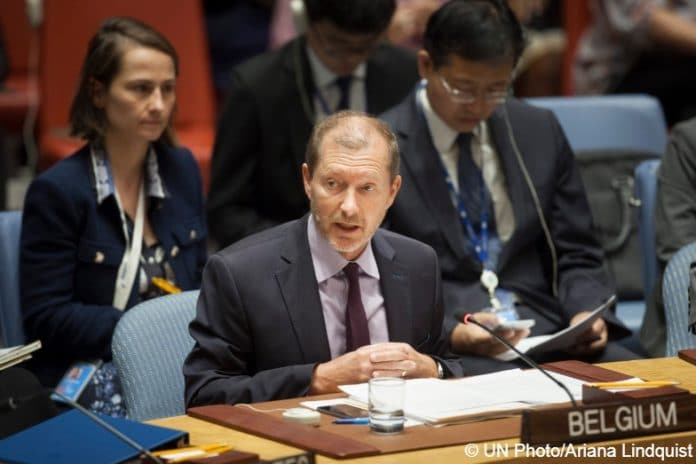European coordination within the United Nations Security Council has advanced, according to Belgian Ambassador Marc Pecsteen de Buytswerve, who represented Belgium at the Security Council.
The Ambassador shared his experiences within the Security Council during a videoconference debate organised by the country’s French speaking United Nations Association APNU (Association Pour les Nations Unies) and Dutch speaking United Nations Association VVN (Vereniging voor de VerenigdeNaties), EGMONT – Royal Institute for International Relations and the United Nations Regional Information Centre for Western Europe.
One voice
In 2019, five European Union Member States – France, Germany, Estonia, Belgium and the United Kingdom – were on the Security Council (this reduced to four EU members in 2020, with the United Kingdom remaining on the Council as a permanent member, but exiting from the EU.)
“It was an opportunity we had to seize, and we did so by advancing European coordination within the Security Council,” the Ambassador told the conference. Belgium was elected to the Council as a non-permanent member from 1 January 2019 to 31 December 2020 and held the presidency of the Council in February 2020.
“All the EU Member States were aligned on every issue during this mandate,” Pecsteen de Buytswerve added, which was not always the case in the past. Joint press conferences held at the end of meetings were a further important development, the Ambassador said.
“The Member States within the Security Council spoke with one voice, showing that the European Union exists within the Security Council,” he explained.

A serious partner
Whilst it is too early to evaluate Belgium’s mandate, the Ambassador said the country is viewed as a “serious, reliable and constructive partner”.
The issue of children in armed conflict was one of the country’s top priorities, and a high-level debate was organised with His Majesty the King of the Belgians to highlight how seriously Belgium views the topic.
“It is not every day that a sovereign addresses the Security Council,” Pecsteen de Buytswerve said.
Humanitarian action, particularly in Syria, was another key priority. In a first for the Council, Belgium also organised a debate on transitional justice and, despite opposition from some, invited speakers from civil society as well as high-level officials, such as Michelle Bachelet, United Nations High Commissioner for Human Rights.
Multilateralism on the defensive
The world’s geopolitical context has evolved greatly since Belgium’s last mandate on the Security Council in 2007-2008, the Ambassador said. Rivalries exist between the great powers, and the United States’ interest has diminished, he remarked. Multilateralism and human rights have been placed on the defensive.
On important issues, such as Syria or Libya, the Council remains sharply divided and it is difficult to make progress, but Pecsteende Buytswerve assured it is not “paralysed.”
“It is of course very frustrating. At the same time, on many other issues, the Council is taking decisions, making progress and can be united. That is the paradox,” the Ambassador said, citing decisions taken over Africa and Latin America.
Two worrying developments threaten the Council, Pecsteen de Buytswerve warned as he looked towards the future. He regrets that the Council has become a public forum with fewer consultations behind closed doors. He is also concerned that decisions taken by the Council are not always respected, such as open violations on the embargo on arms and weapons in Libya.
“It is a serious blow to the Security Council, and if this development continues, it is a very serious threat and not in the interest of anyone,” he warned.
The Ambassador remains positive, however, and said that on certain occasions, elected Council members were able to contest the unwritten privileges of permanent members. They took the initiative, for example, by drafting resolutions, as was the case with Syria. “It was a new dynamic,” he said.
He added that ultimately, “as you need nine votes to adopt a resolution, the five permanent members need the elected members.”
Following his post in New York, the Ambassador recently took on his new role as Permanent Representative of Belgium to the United Nations Office at Geneva.




